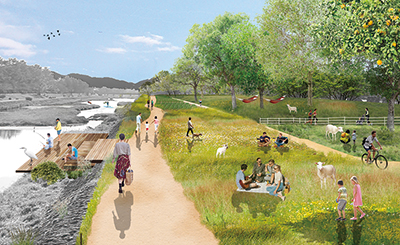Lifeworlds of Sustainable Food Consumption and Production:
Agrifood Systems in Transition
- FS①
- FS②
- PR
- FR①
- FR②
- FR③
- FR④
- FR⑤
- CR
2021
Steven R. McGREEVY
RIHN>> Annual Report
>> Project's Page

Kyoto, Kamogawa River in the year 2050. A post-growth food system in which nature and people fl ourish. (credit: © 2021 AOI Landscape Design, Yoshida Aoi)

Ecokana app UI. Download the app via the QR code! Android on the top. iPhone on the bottom.
Over the course of the FEAST project, the evidence we gathered pointed to one conclusion: dramatic changes are needed in the food system and in society at large if we are to live sustainably. We need new values, radically different ways of provisioning our societies, and economic models that reject the logics of growth and embrace sufficiency.
Major findings from the FEAST project:
- The ecological footprint of Japan’s food consumption is dominated by imported and processed foods. Food consumption by urban and aged populations has a larger footprint than that of rural peoples. A decentralized food system that supports local production for local consumption will shrink food footprints and make food systems more sustainable. At the same time, agricultural land in urban areas is being paved over to make new housing developments, even though Japan’s population is shrinking, leaving millions of homes unoccupied. Integrated agricultural and urban/suburban land use policy is desperately needed.
- Sustainable food policy involves multiple government departments and sectors of the economy. Agricultural production, distribution, public health, tourism, environmental concerns, technology and business, education, city planning—all of these areas are related to food. The challenge is to integrate these elements to produce coherent and effective food policies. Current governance structures are correspond to sectoral and narrow departmental structures; they are inadequate to the challenges of sustainability. In FEAST, we partnered with diverse local stakeholders to create food policy councils able to address the challenges of developing integrated food policy.
- Food production must shift away from industrial, monoculture, large-scale operations towards more robust agroecological approaches. Agroecological production is based on ecological principles and protects nature and the living creatures, for example bees, that enable food production. Japan urgently requires regulations on neonicotinoid insecticides already restricted in the EU yet found in >60 ‘household products’ sold in Kyoto City, with a focus on avoiding both negative impacts on ecosystems and farmers’ livelihoods. Agroecological farmers have high autonomy and produce highly diverse organic crops. Support systems for new farmers in Japan are quite generous fi nancially, but farmers are pushed into industrial agriculture and training programs for sustainable and organic agriculture are not available.
- Informal food practices, such as gardening, food sharing, hunting and foraging, and rearing small livestock, will play a critical role in creating regional, distributed, and sustainable food systems. These informal food practices improve community food security and resilience, as well as sense of well-being and physical and mental health.
- In workshops on the future of food and agriculture, Japanese citizens indicated their interest in more leisure time for working in the garden, cooking, and enjoying food. They also indicated widespread support for local production for local consumption in schools, restaurants, and community kitchens.
Download ‘Ecokana’, the FEAST app that explores the environmental, social, and health impacts of the food you eat! With information on close to 1,800,000 food products, you can learn more about how food consumption affects nature and society, and push food companies to make our food system more transparent.
FEAST project research and collaboration with food stakeholders in Japan will continue into the future through the formation of the FEAST NGO. We hope to continue to develop food policies with local stakeholders that make our food systems more sustainable and resilient.
